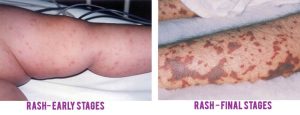Dr Jon Barrell
The Travel Medicine consultation can save lives at home and abroad. It is the ideal opportunity to discuss the vaccines to reduce the risk of Meningitis, Pneumonia, and Shingles (that very painful rash caused by the Chicken Pox virus). Since mid-2015, a new Meningococcal Vaccine has been recommended by the Australian Government to reduce the risks of this very serious disease.
Meningococcal Disease
Meningococcal disease is caused by a Gram-negative bacterium, Neisseria meningitidis, commonly known as meningococcus. There are 13 different strains, known as serogroups. Globally, serogroups A, B, C, W135 and Y most commonly cause disease. There are a number of different vaccines, but currently none provide protection against all subgroups.
N. meningitidis can cause invasive meningococcal disease (IMD) which includes meningitis and septicaemia. Septicaemia, either on its own or with meningitis, can be particularly severe. N. meningitidis can also cause other localised infections, including pneumonia, arthritis and conjunctivitis, but these are less common.
Humans are the only carriers of N. meningitidis. Meningococcus is transmitted via droplets or direct contact and has an incubation period of between 2 and 10 days, but commonly 3 to 4 days.3 A proportion of the population carry N. meningitidis without developing disease.
Individuals at greater risk of meningococcal infection include
- infants and children up to 5 years old
- late adolescence and early adulthood (15-19 years old)
- laboratory workers who handle meningococci
- university students and new military recruits living in residential colleges (particularly in their first year)
- others groups of people who occupy small areas of living space
- smoking
- intimate kissing with multiple partners
- recent or current viral infection of the upper respiratory tract
Serogroup A disease occurs predominantly in low-income countries, particularly countries in sub-Saharan Africa.
Serogroup B (‘MenB’) is the major cause of sporadic meningococcal disease in many developed countries, particularly since the meningococcal serogroup C (‘MenC’) conjugate vaccine program began in Australia in 2003.
picture from mumcentral.com.au
Recommendations for infants and children
Men ACWY: A single dose of Meningococcal acwy Cvaccine is recommended for all children at the age of 12 months and is provided free of charge under the National Immunisation Program
Men B: Meningococcal B vaccine is now recommended for infants and young children, particularly those aged <2 years, due to their higher risk of serogroup B meningococcal disease. Prophylactic administration of paracetamol is recommended with every dose of vaccination against this disease in children <2 years of age due to the increased risk of fever following vaccine administration.
Recommendations for adolescents and adults 15-19 years
Men B: Vaccination against this strain of disease is recommended in a 2-dose schedule for all adolescents aged 15–19 years due to their higher risk of serogroup B meningococcal disease compared with other ages, especially those living in close quarters, such as new military recruits and students living in residential accommodation.
Vaccination should be given prior to entry to such risk settings or as soon as possible after entry .
Recommendations for persons with condition(s) associated with an increased risk of meningococcal disease
Additional doses of vaccine may be recommended for persons with these risk factors.
- defects in or deficiency of complement components, including factor H, factor D or properdin deficiency
- current or future treatment with eculizumab (a monoclonal antibody directed against complement component C5)
- functional or anatomical asplenia
- HIV infection, regardless of stage of disease or CD4+ count
- haematopoietic stem cell transplant, and
- laboratory personnel who frequently handle Neisseria meningitides
Recommendations for travellers
Ameningococcal vaccine is recommended for persons who are planning travel involving a greater risk of exposure to meningococcal serogroups A, C, W135 and Y
- individuals who intend to travel to or reside in parts of the world where epidemics of group A, C, W135or Y meningococcal disease occur, particularly the ‘meningitis belt’ of sub-Saharan Africa
- individuals who intend to travel to mass gatherings, for example, pilgrims travelling to the Hajj. In some instances, documentation of vaccination is required for country entry visas.
Contraindications
The only absolute contraindications to meningococcal vaccines are anaphylaxis following a previous dose of any meningococcal vaccine, and anaphylaxis following any vaccine component.
Previous meningococcal disease, regardless of the serogroup, is not a contraindication to administration of any meningococcal vaccine.
Previous vaccination with the strain-specific meningococcal B vaccine used in New Zealand, is not a contraindication
So please see your Doctor now, regardless of when you travel, to discuss the vaccines to reduce the risk of Meningitis, Pneumonia, and Shingles,
Dr Jon Barrell
Springs Medical Centre Daylesford & Trentham in Victoria
Proud members of the Travel Medicine Alliance
www.springsmedical.com.au
